Fishing News
Government plans for ‘protection zones’ around the UK coastline are inadequate and won’t halt the dramatic decline of marine species, according to environment groups.
- WWF: New marine proposals are “a drop in the ocean”
They have warned that much tougher legislation and more ambitious marine protection zones are needed to help preserve sea life.
The EU has ordered member states to set up special zones under its Marine Strategy Directive, in a bid to halt the slide in biodiversity caused by overfishing and industrialisation.
The first UK offshore sites are due to be announced soon but critics say they fall far short of Government promises to set up a network of marine reserves where stocks would be safeguarded against overfishing. Continue reading ‘Environment groups say UK marine protection zone plans are inadequate’

Scientists have published the first study that casts doubt on some of the health benefits of fish oils - and say that daily doses may actually increase the risk for people already suffering heart disease.
- Are dietary recommendations for the use of fish oils sustainable? - study from Canadian Medical Association Journal
- Charles Clover: Omega 3 from oily fish health benefits - the totem wobbles
-
Omega 3 fatty acids contained in oily fish such as salmon and tuna have long been hailed a “super food” which plays a key role in boosting our immune system, staving off heart attacks and cancer as well as increasing brain power.
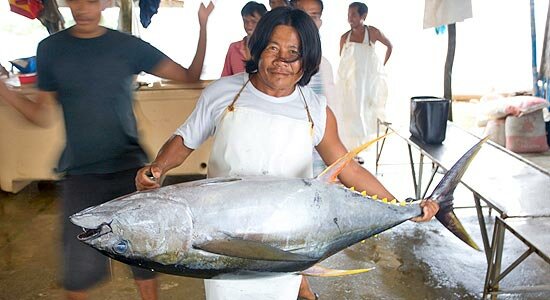
Tuna are rich in Omega 3 fatty acids, but are also under threat from overfishing
But the latest study finds little evidence to support the more extravagant claims and experts discovered that angina sufferers may put themselves at higher risk by taking fish oils.
The authors say that people in developed countries already have access to plenty of Omega 3 fatty acids in their diet, while people in poor countries were being deprived of essential oils and proteins by foreign fishing fleets. Continue reading ‘Omega 3 in oily fish may increase heart disease risk, study finds’

Most deep sea fisheries are unsustainable and should be closed, a new report says.
The call comes after a 25-year-long marine study revealed that commercial fishing in the north-east Atlantic could be damaging species at much greater depths than previously believed.
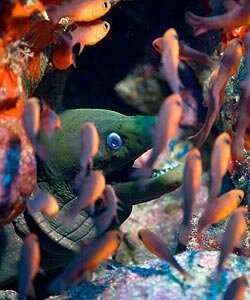
Moray eel - the study found numbers of one species of eel were down by half
Numbers of deep-water species living a kilometre below the reach of trawlers are apparently being affected by fishing practices, the new study found.
Although scientists have known that commercial fishing does affect deep-water fish populations they have now discovered it is occuring at much greater depths.
Populations of north-east Atlantic commercial deep-water fish such as black scabbardfish, orange roughy and roundnose grenadier have dwindled since deep-water fishing started in the area in the late 1980s but a quota system wasn’t introduced until 2003.
Dr David Bailey of the University of Glasgow, who led the study, published in the journal Proceedings of the Royal Society B, said:
“Commercial fishing may have wider effects than anyone previously thought, affecting fish which we assumed were safely beyond the range of fishing boats. We were extremely surprised by this result and believe that it has important implications for how we manage the oceans.”
Deep-water fish living off the west coast of Ireland were monitored by Natural Environment Research Council-owned ships from 1977 until 1989 before any fishery was operating in the region.
Researchers checked the same area again from 1997 until 2002 using exactly the same methods and the results were then compared as part of an EU-led project to study deep-sea species. Continue reading ‘Deep sea fish suffer far greater damage than was first thought’

Nearly half of all fish produced for food is now farmed rather than caught in the wild, a new UN report reveals.
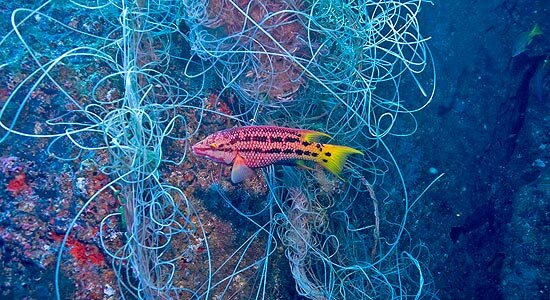
The biennial State of World Fisheries and Aquaculture (Sofia) report shows that stocks continue to be depleted by overfishing
The amount of fish produced by farming rose in the past two years while the number of wild fish stocks ranked as over-fished, depleted or fully exploited increased to 80 per cent of the world’s stocks.
The figures released in Rome by the United Nations Food and Agriculture Organisation (FAO) indicate that the amount of fish caught at sea has reached a plateau and may be in decline when suspected over-reporting by China is taken into account.
On the other hand, the amount of fish raised by aquaculture rose to 47 per cent of all produced for food. Continue reading ‘Farmed fish set to overtake wild caught fish for first time’

Fish must be exploited less heavily if they are to adapt to climate change, according to the UN Food and Agriculture Organisation.
Responsible fishing practices need to be more widely adopted to tackle over-fishing and fishery management plans should include strategies for coping with rising sea temperatures.
“Best practices that are already on the books but not always implemented offer clear, established tools towards making fisheries more resilient to climate change,” said Kevern Cochrane, one of the authors of The State of World Fisheries and Aquaculture (Sofia), 2009.
“So the message to fishers and fisheries authorities is clear: get in line with current best practices, like those contained in FAO’s Code of Conduct for Responsible Fisheries, and you’ve already taken important strides towards mitigating the effects of climate change.”
Climate change is already altering the distribution of both marine and freshwater species with warmer-water species being pushed towards the poles and experiencing changes in habitat size and productivity, the report says.
It is also affecting the seasonality of biological processes and altering marine and freshwater food sources which has unpredictable consequences for fish production.
A decrease or loss of locally available fish stocks will pose serious problems for communities which depend on abundant supplies for their livelihood.
“Many fisheries are being exploited at the top range of their productive capacity. When you look at the impacts that climate change might have on ocean ecosystems, that raises concerns as to how they’ll hold up,” said Cochrane.
Vulnerable communities who rely on their fishing and aquaculture industries need to take urgent action to strengthen their resilience to climate change, the report urges.
The authors of the report say that fisheries and aquaculture make a minor but significant contribution to greenhouse gas emissions during fishing operations and the transport, processing and storage of fish.
The average ratio of fuel to carbon dioxide (CO2) emissions for capture fisheries is estimated at about 3 teragrams of CO2 per 1m tonnes of fuel used.
“That could be improved. Good fisheries management can substantially improve fuel efficiency for the sector,” Cochrane said.
“Overcapacity and excess fishing capacity mean fewer fish caught per vessel - that is, lower fuel efficiency - while competition for limited resources means fishers are always looking to increase engine power, which also lowers efficiency.”
Much of the industry’s carbon footprint comes in the transport of the fish, particularly by air, once they have been harvested.
Intercontinental airfreight emits 8.5 kg of CO2 per kilogram of fish transported. This is about 3.5 times that for sea freight and more than 90 times that from local transportation of fish where it is consumed within 400 kilometres of catch.

EU: sharks now need protection from overfishing from The Times
It could spell the end of rock salmon or huss being sold at the chip shop. The European Commission, presenting its first plan to limit all types of shark fishing, has said that it had to act to stop several types of shark being pushed towards extinction. Read more . . .
‘Google Ocean’ launched as extension of Google Earth to map the seabed from The Telegraph
Google Ocean, which will be included in the newest version of Google Earth, will allow users to swim around underwater volcanoes, watch videos about exotic marine life, read about nearby shipwrecks, contribute photos and watch unseen footage of historic ocean expeditions - all from the comfort of their homes. Read more . . .

Vessels catching mackerel around the Scottish coast have been awarded certification by the Marine Stewardship Council, recognising that their landings are from well-managed stocks.
This follows the certification of North Sea herring last year as a well managed stock that people can eat without fear that they are destroying the stock or destroying other species as by-catch.
The Scottish Pelagic Sustainability Group is responsible for Scotland’s largest individual catches of fish. They landed 95,700 tons of mackerel in 2007. Smoked, frozen and fresh mackerel will soon be on sale bearing the MSC logo meaning that it can be traced back to the independently certified SPSG fishery.
John Goodlad, chairman of the Group, said: “This is another defining moment for the Scottish pelagic industry as it establishes its environmentally responsible credentials.”
Continue reading ‘Eco-label awarded to UK mackerel fishery’

The overfishing of the oceans is contributing to global warming, scientists have found.
They have discovered that the ocean’s ability to absorb pollution and purify the atmosphere is influenced by an unexpected factor – fish droppings.
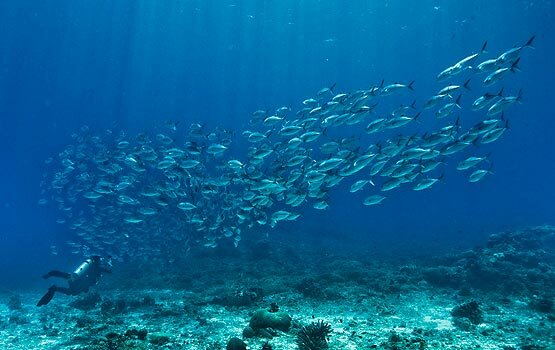
Alkaline chemicals such as calcium carbonate from fish poo can help balance this acid and help to take carbon dioxide out of the atmosphere
The increase in carbon dioxide in the atmosphere not only drives global warming, but also raises the amount of CO2 dissolved in ocean water, resulting in the sea becoming more acid and potentially a threat to sea life.
Alkaline chemicals such as calcium carbonate can help balance this acid and help to take carbon dioxide out of the atmosphere.
Scientists previously thought the main source for this balancing chemical was the shells of marine plankton, but they were puzzled by the unexpected quantities of carbonate in the top levels of the water.
Continue reading ‘Fish poo could save the planet’

US domestic trade legislation could be used to save the Atlantic bluefin tuna after the failure of an international body to restrict rampant over-fishing of the endangered species.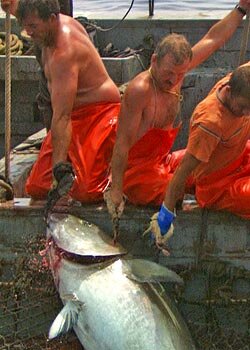
Conservationists and concerned scientists are discussing applying for a US import ban after a UN-recognised body set up to manage Atlantic and Mediterranean tunas awarded fishermen a total allowable catch in excess of what scientists recommended amid warnings that the stock could collapse.
Member nations of the International Commission for the Conservation of Atlantic Tunas awarded fishermen in the Mediterranean and Eastern Atlantic a quota of 22,000 tons this year against a scientific recommendation of 8,000-15,000 tons.
The United States is now a net importer of bluefin tuna, which would mean import restrictions against fish caught and ranched in the Mediterranean could have an effect on reducing international trade and placing pressure on other nations to follow suit.
Options being discussed by conservationists include a listing under the US Endangered Species Act and a listing under Appendix II of the Convention on International Trade in Endangered Species (CITES), which restricts trade in caviar and elephant ivory, but both of these would be hotly opposed by fishermen and fishing nations.
A resolution by the UN general assembly to reduce catches of bluefin tuna is another option under consideration.
Andrew Sharpless, executive director of Oceana, said: “ICCAT has shown that its true name is I CAN’T. It can’t find the courage to save the bluefin tuna from being commercially hunted and killed to where it is in danger of disappearing forever. Continue reading ‘US trade embargo could save bluefin tuna’

Fishing skippers, owners and an auctioneer in the port of Newlyn, England, have been convicted of deliberately overfishing protected fish stocks for financial gain and ordered by a judge to pay £190,000 in fines with more to come.
Six skippers, an owner and an auctioneer were convicted of a total of 114 specimen charges of fraudulently selling illegally-caught protected stocks such as cod and disguising them as non-quota species which could be landed legally.
The number of charges brought, and the decision by inspectors to investigate the activities of a whole port are thought to make this the biggest case ever brought by the British government involving “black” fish. Continue reading ‘Cornwall rocked by massive fraud over selling ‘black’ fish’

George Bush has designated 200,000 square miles of the Pacific as conservation areas in a bid to re-write his conservation reputation before he leaves office.
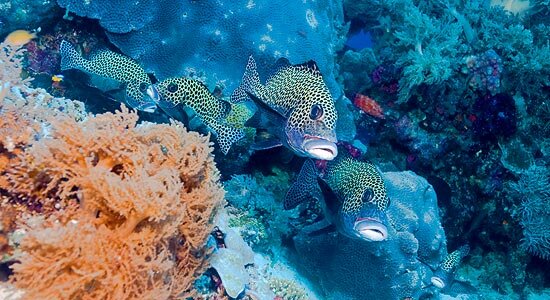
Mr Bush, who has steadfastly refused to impose statutory limits on carbon dioxide emissions to combat global warming, became the leader who has protected more of the oceans than anyone else in the world.
The areas protected, with the active intervention of the First Lady, Laura Bush, include pristine coral reefs, the habitat of vanishing marine species, and the deepest place on Earth, the Mariana Trench. Continue reading ‘George Bush designates marine reserves the size of Texas as one of last acts as president’

![]()








